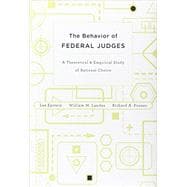
Note: Supplemental materials are not guaranteed with Rental or Used book purchases.
Purchase Benefits
What is included with this book?
| List of Figures | p. vii |
| List of Tables | p. ix |
| General Introduction | p. 1 |
| Technical Introduction | p. 17 |
| Linear Regression | |
| Logistic Regression | |
| Miscellaneous Points | |
| A Realistic Theory of Judicial Behavior | p. 25 |
| Three Concepts of Legal Realism | |
| The Labor-Market Theory of Judicial Behavior | |
| The Judicial Utility Function | |
| The Legalist Countertheory of Judicial Behavior | |
| Antirealism Personified: Judge Harry Edwards. | |
| The Previous Empirical Literature | p. 65 |
| History | |
| Ideology Measures | |
| Previous Studies of Judicial Ideology | |
| Other Influences | |
| Appendix: Empirical Studies of Judicial Behavior | |
| The Supreme Court | p. 101 |
| Data | |
| Ideological Voting by Justices | |
| Changes in Justices' Ideology | |
| Unanimous Decisions: The Role of Ideology | |
| Non-unanimous Decisions: The Role of Ideology | |
| Non-unanimous Decisions: Group Effects. | |
| Appendix: The Corrected U.S. Supreme Court Database. | |
| The Courts of Appeals | p. 153 |
| Data | |
| Explaining the Judges' Votes (1) | |
| Explaining the Judges' Votes (2) | |
| Group Influences in the Songer Data. | |
| Ideology, Conformity, and Panel Composition Effects in the Sunstein Data | |
| The Original and Corrected Songer Database | |
| The Original and Expanded Sunstein Database | |
| Measures of Ex Ante Ideology of Supreme Court Justices, 1937-2009. | |
| The District Courts and the Selection Effect | p. 207 |
| District Court Decisions Derived from the Sunstein Database | |
| Ideological Influence on District Judges | |
| Reversals | |
| Dismissals | |
| Another Selection Effect | |
| The Paradox of Discretion | |
| Ideology in Sentencing | |
| Dissents and Dissent Aversion | p. 255 |
| Costs and Benefits of Dissenting | |
| The Effect of Panel Composition | |
| A Formal Model of Deciding Whether to Dissent | |
| Empirical Analysis | |
| Effects of Senior Status and Age on Dissent Rates | |
| The Questioning of Lawyers at Oral Argument | p. 305 |
| Empirical Analysis | |
| Number of Questions or Number of Words? | |
| Explaining Variations in the Number of Questions and the Total Number of Words in Questions | |
| Individual Justices | |
| The Auditioners | p. 337 |
| Appointment and Promotion in the Federal Judiciary | |
| Auditioning for the Supreme Court | |
| Voting Behavior of Auditioners for the Supreme Court | |
| Auditioning for the Courts of Appeals | |
| Voting Behavior of Auditioners for the Courts of Appeals. | |
| Appendix: Court of Appeals Judges in the Supreme Court Promotion Pool, 1930-2010 | |
| Conclusion: The Way Forward | p. 385 |
| Acknowledgments | p. 405 |
| Index | p. 407 |
| Table of Contents provided by Ingram. All Rights Reserved. |
The New copy of this book will include any supplemental materials advertised. Please check the title of the book to determine if it should include any access cards, study guides, lab manuals, CDs, etc.
The Used, Rental and eBook copies of this book are not guaranteed to include any supplemental materials. Typically, only the book itself is included. This is true even if the title states it includes any access cards, study guides, lab manuals, CDs, etc.